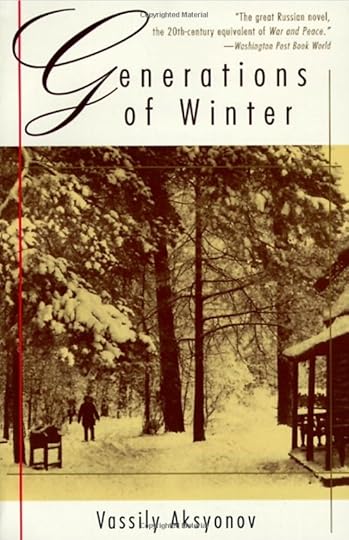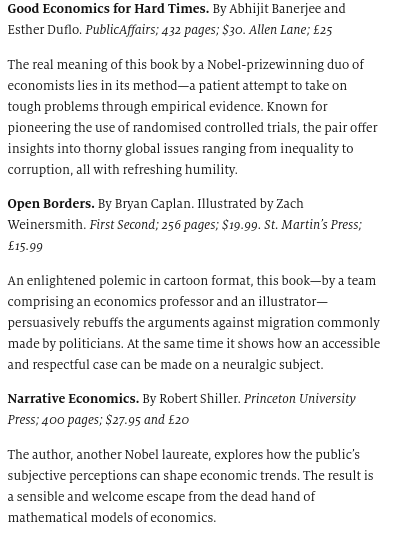Bryan Caplan's Blog, page 39
December 27, 2019
What I’ve Been Reading Over the Holidays

1. Ayn Rand’sWe the Living. This is only my second reading of Rand’s first novel, about the tragic life of a young individualist women trapped in the Soviet hell-state. Especially given the prominent role of Jews in the early Bolshevik Party, modern fans of political externalities arguments would probably fear the arrival of a Soviet Jewish refugee. To the best of my knowledge, Rand never discussed political externalities, but there’s no doubt she fully supported open borders. When asked, “...
December 24, 2019
My Hayek Memorial Lecture
Though I’m not a big fan of Hayek, the UK-based Institute of Economic Affairs asked me to deliver the 2019 Hayek Memorial Lecture. It’s a preview of my book-in-progress,Poverty: Who To Blame. It’s also an attempt to get people to pay comparable attention to all three parts of my book. At least until my IEA talk, almost all critics focused entirely on book’s final third, when I explore the extent to which the poor are to blame for their own poverty. So I rewrote the presentation to...
December 23, 2019
Socialism: The Failed Idea That Never Dies

I’ve easily read a hundred books on the evils of socialism. I was quite surprised, then, by how much I learned from Kristian Niemietz’sSocialism: The Failed Idea That Never Dies, available for free download. Yes, I already knew that socialist regimes go through a popularity sequence, starting at “This socialist regime is a model for the world” and ending with “That’s not real socialism.” Niemietz, however, describes this sequence with great precision and eloquence:
1. The honeymoon period
...
December 20, 2019
The Meaning of Generations of Winter

Vassily Aksyonov was a Soviet dissident writer and GMU professor. His most famous work was probablyGenerations of Winter, a sprawling historical novel about three generations of a Soviet family. GMU history professor Steven Barnes, a great admirer of the book, doesn’t just assign the book in his class on modern Russian and Soviet history; an original essay on the book is the course’s most important assignment. While I rarely quote undergraduate work, Tristan Caplan’s pieceonGenerations of...
December 10, 2019
Explain Your Extremists
No matter how controversial your political views are, there are always people on “your side” who hold a more extreme position than you do. How do you account for such people?
Top scenarios:
1. The extremists are actually right, but their proposals are “politically impossible.” It’s better to ask for half a loaf and get it than demand a totally unattainable whole loaf.
2. The extremists are actually right, but their proposals are politicallyunstable. Even if the extremists prevailed in the...
December 6, 2019
The Economist Names Open Borders a Best Book of 2019!
The link is gated, but here’s the screen cap! My book with Zach Weinersmith is sandwiched on the list between three Nobelists:

The post appeared first on Econlib.
November 27, 2019
Freiman: Why Not Purge Them?
Thanksgiving is upon us, and the next election is less than a year away. Upshot: You are about to get another big chance to purge family members for political reasons. Should you take the plunge? Philosopher Chris Freiman humbly tries to dissuade you in his forthcoming Why It’s OK to Ignore Politics.Freiman speaks:
Only about a third of partisans think that members of the opposing party “have their heart in the right place but just come to different conclusions about what is best.” So here’s...
November 26, 2019
Deludedly Deeming Deregulation a Disaster
I posted this on Twitter two weeks ago.
Suppose housing deregulation drastically increased housing supply.
Housing prices fall 50%.
Living space per capita doubles.
What share of the U.S. population would nevertheless call housing deregulation a “disaster”?
— Bryan Caplan (@bryan_caplan) November 13, 2019
The results were much as expected. Housing deregulation could deliver everything its proponents promise. Housing deregulation could bring back a world where high school grads commonly buy...
November 25, 2019
The National Academy of Sciences on Native/Foreign Intermarriage
How socially distant are two groups? One of sociologists top measures is simply the rate of intermarriage. Since college graduates almost never marry high school dropouts, the two groups are probably extremely socially disconnected. When intermarriage rates rise, similarly, sociologists naturally infer that caste barriers are coming down.
When people bemoan the cultural divide between natives and immigrants, then, looking at intermarriage rates is a good place to start. I reproduce recent...
November 21, 2019
Immigration Research for the Future?
Question from an anonymous reader, reprinted with permission:
Hi Bryan,
First of all, I’d like to say that I really loved your new book Open Borders! It’s an amazing feat in terms of making a clear case, exploring many arguments and counter-arguments and presenting everything in a fun, engaging way.
I have one question for you. After having gone through all the literature for this book, where do you think additional research is more likely to have a high marginal return? If some graduate...
Bryan Caplan's Blog
- Bryan Caplan's profile
- 374 followers



